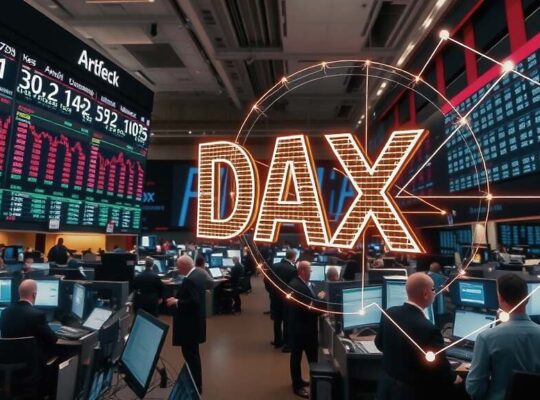The German DAX opened the trading day on Reformation Day in negative territory, reflecting a broader sense of caution across global markets. Shortly after 9:30 AM, the benchmark index registered at approximately 24,035 points, a 0.3% decrease from the previous day’s closing level. This subdued performance arrives amidst a complex interplay of record-breaking earnings in the US technology sector and concerning valuations hinting at potential market fragility.
The deluge of exceptional profits reported by US tech giants – following Apple and Amazon’s latest earnings releases which showcased unprecedented gains over the last twelve months, building on Microsoft’s previously announced record – is being met with a degree of apprehension. Analysts, including Thomas Altmann of QC Partners, highlight that these stellar results are, in a crucial sense, necessary to justify the significant rise in US stock market valuations witnessed in recent rallies. The soaring valuations require sustained profit growth to realign with historical averages, suggesting the market’s current elevation may be precarious.
Elsewhere, the Japanese Nikkei 225 is exhibiting a rapid ascent, already boasting a substantial year-to-date gain of nearly 31%. This unprecedented rise has prompted warnings of technical overbought conditions. The index’s current price-to-book ratio indicates a degree of overvaluation unseen in at least two decades, raising concerns about a potential correction.
In contrast, the German DAX continues to struggle for momentum following a strong first half of the year. Its current year-to-date gain of only 1.88% in the second half is considerably less robust and the index has been mired in a sideways trading pattern since late May. This lack of direction raises questions about the underlying health of the German economy and the efficacy of current policies to stimulate growth. The fluctuating performance – with an even split of positive and negative trading days over the last six and twenty periods – further underscores this uncertainty.
The Euro also weakened slightly, trading at $1.1563, reflecting broader anxieties surrounding the economic outlook for the Eurozone and potentially indicating a re-evaluation of relative currency strength. The muted performance of the DAX, coupled with the concerning valuation metrics in Japan and the fluctuating Euro, paints a picture of a global market wrestling with both impressive earnings and significant underlying risks. Investors are closely observing whether the current stream of record earnings can permanently sustain the inflated valuations or if a period of correction lies ahead.












